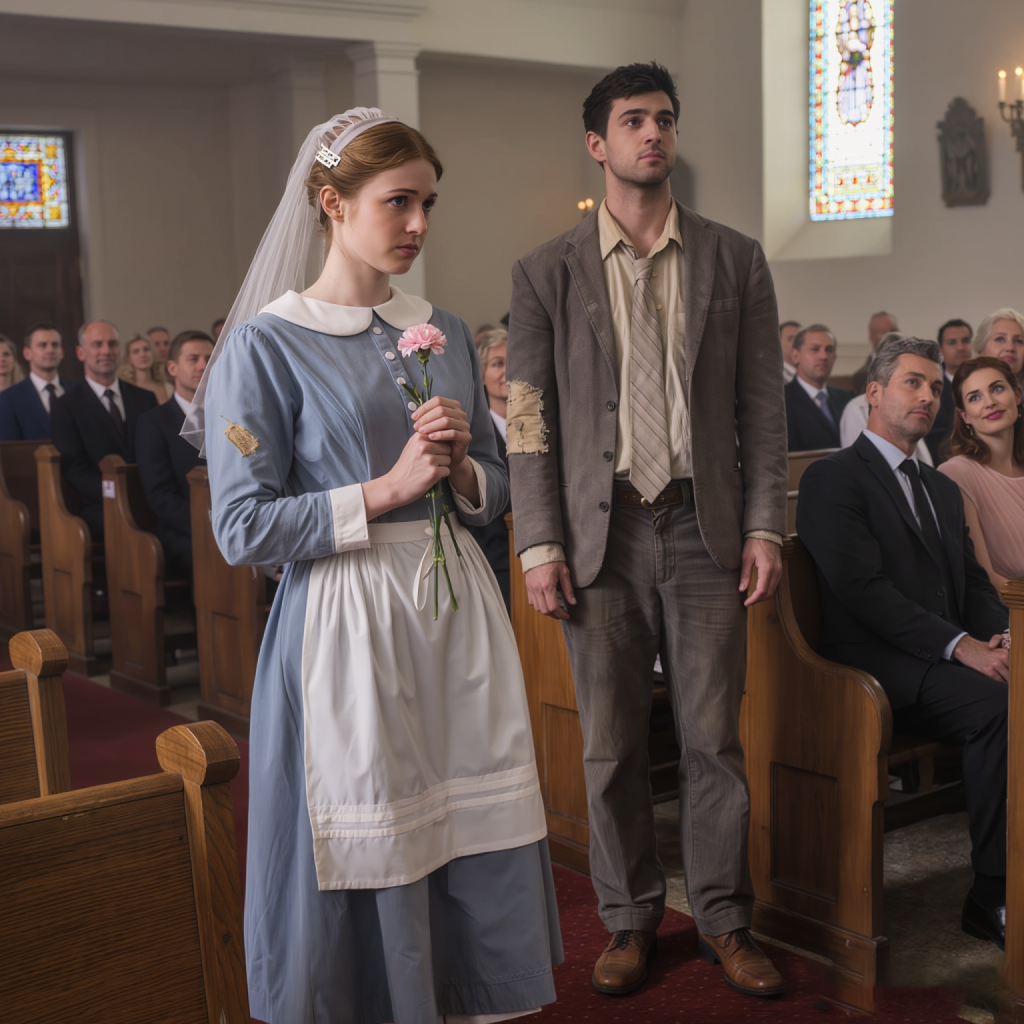The Whispering Chapel
The chapel glowed in the soft light of a Saturday afternoon. Sunlight streamed through stained glass, painting ribbons of color across polished pews. Yet beneath the quiet hum of the organ, whispers slithered through the air.

Emily Parker, a young nanny, stood at the altar in a simple blue dress. Her veil was pinned with trembling fingers, and in her hands she held a single pink carnation — the only flower she could afford.
Beside her stood Michael Turner. His jacket was threadbare, his shoes scuffed from long miles. He looked painfully out of place among silk ties and jeweled gowns. A few guests exchanged glances. Some chuckled. Others didn’t bother to hide their disdain.
From the front pew, a woman whispered loudly enough for half the chapel to hear:
“A nanny and a drifter… what a joke.”
Emily’s cheeks flushed crimson. Her eyes fell to the floor — until Michael’s calloused hand found hers. He didn’t look at the crowd. He just squeezed her hand, steady and sure.
The Mocking Applause
When the pastor pronounced them husband and wife, a ripple of laughter spread through the room, followed by clapping that sounded more like mockery than celebration.
Michael didn’t flinch. He stepped forward, took the microphone, and spoke — his voice low, calm, unshakable.
“I know what you see — a poor man marrying a nanny. But what you don’t see… is the truth.”
The whispers died instantly. The sound of his voice filled the chapel, echoing under the stone arches.
“For years, I was invisible. I slept on park benches. People crossed the street rather than meet my eyes. To most, I was nothing. But Emily…” — he turned to her, his voice softening — “Emily saw me.”
The laughter was gone now. The air itself seemed to listen.
The Hidden Past
“She brought me food when she barely had enough for herself,” he continued. “She talked to me like I mattered — when no one else even looked my way. She gave me more than kindness. She gave me back my dignity.”
A murmur of surprise rippled through the pews. Emily’s eyes glistened.
“What you don’t know,” he said, “is that I wasn’t always down on my luck. I once owned a business. I wore suits finer than yours. But greed — mine and others’ — took it all. I lost everything. And when I fell, not one so-called friend reached out. Except her.”
He turned toward Emily again, his expression gentle, grateful.
“So laugh if you want. But understand this — love isn’t silk or gold. Love is sacrifice. Love is seeing a soul when the world only sees failure. Emily gave me that. And every day, I’ll prove she wasn’t wrong to believe in me.”
The chapel was silent. The faces that had smirked moments before now stared, ashamed. A few guests wiped their eyes.
Emily whispered, barely audibly, “I love you.”
This time, when applause came, it wasn’t mocking. It was thunderous.
A Different Kind of Headline
News of the wedding spread quickly. The next morning’s paper ran the story:
“Nanny Marries Drifter.”
But one week later, a new headline appeared:
“Former CEO Michael Turner Reemerges — Fortune Restored.”
Before losing everything, Michael had quietly invested in a struggling company’s stock — one that had just gone public. Overnight, his dormant portfolio was worth millions.
When reporters asked why he’d never sold earlier or revealed his wealth, he simply smiled.
“I needed to know who would stand with me in the dark — not just in the light.”
The Life They Chose
Emily stood beside him, no longer in a faded dress but in clothes she chose for herself. Yet even with wealth returned, their life stayed simple.
They laughed over morning coffee in a modest kitchen. They walked hand in hand through the park where they’d first met. Their home wasn’t built on fortune — it was built on faith, on humility, on the kind of love that survives every test.
And if you ever ask them about that day in the chapel — about the laughter, the whispers, the shame — they’ll tell you it was the moment they learned what love really means:
That true wealth isn’t measured in money or status.
It’s measured in the courage to see someone — really see them — when the rest of the world looks away.